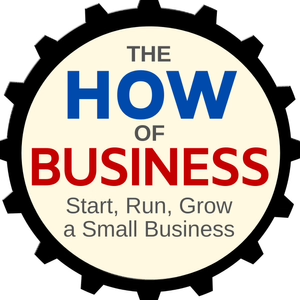
3. Where to Start
06/13/19 • 39 min
Before we get ahead of ourselves, let's start where everyone does... the beginning.
The top 20 questions I first get from people when they first start out
20. Should I name my business my own name, or should I create a separate company name for it?
The short answer is, will this company be intertwined (and reliant on) your own identity, or can it live outside of you. Also, will you ever sell your company. I can't answer this for you, but this will help you come to a more solid conclusion.
4:32 -- 19. Incorporate vs. Sole Prop etc...
Depends on the business structure, but basically stay as a sole prop until you earn more money than you need to live. That way, when you are making more money, you can incorporate, but you can start as a sole prop TODAY.
The caveat is that if it's a highly-liable company, you may consider incorporating earlier to cover yourself from a legal perspective.
We'll dive into this in 2 later episodes, one focussed around Canadian companies and taxes, and the second around American.
6:16 -- 18. Do I need a website with a portfolio.
Not necessarily. Most of your first clients will come from word of mouth, so they will hire you for you. Don't let lack of portfolio stop you from looking for new clients. The reality is, people make decisions from feeling, not necessarily from an intellectual place so instilling confidence in your clients, that you are right for the job is much more important than your portfolio when first starting out.
7:38 -- 17. Do I charge my client tax right away?
This will depend on the region you live in, so be sure to check with your local tax laws. In general, if it's optional in your region, I would suggest registering a tax number right away and charging clients. It adds to your professionalism, will allow you more "write offs" (which we'll cover in another episode), and you can claim that to get back anyways.
9:12 -- 16. Do I need a contract and what should it say?
Legally, the answer is yes. However, you can get some contracts online that will cover you until you until you start diving into deeper waters.
I would say, it's worth investing in a lawyer to draw you up a contract after you've made your first 20K or so. That's not a rule, but let's just say if you're making 90K per year, you should probably be seeking some legal counsel to make sure your business is protected.
10:35 -- 15. What does a proposal look like, and what should it include?
Use a PDF or Google Doc to stat. Include the following
-- Intro to project
-- Breakdown of phases
-- Cost breakdown
-- Social Proof (optional)
-- Payment schedule
12:47 -- 14. Do I need project management softwares?
There are sooo many! If you're just starting out, I would suggest a simple setup of Google docs and folders to get you started with a folder for client to upload image assets, and website copy.
Keep a Google sheet of timeline and payment schedule in there for bonus points.
13:44 -- 13. What do I charge?
There are soooo many answers to this question, but here are some initial steps.
1. Find out what your competitors are charging to get a ballpark
2. Decide on an hourly rate, and price projects using the estimated hours x 30% buffer. You don't need to show clients that calculation, but you can use it for your own references as a starting place.
3. Value pricing: it's very difficult to value price from day 1, so we'll get into that at a later date.
16:24 -- 12. How do I get referrals and testimonials for my future clients?
Ask them!
This might seem very awkward at first, but here's a quick script to help you along. Also, make sure to ask the verbally first towards the end of their agreement.
When you start the conversation, ask...
How was everything for you?
How was it paced out?
How was my communication?
then follow up with,
Hey _______,
That's amazing! I would love other people to have the same experience as you, do you mind putting ________ in writing, I'd love to feature you on my site.
Take the feedback, both good and bad and either turn it into a testimonial, or implement the improvements in your process.
It's important to take the negative feedback as well as the positive to make changes and grow as a company.
17:53 -- 11. What happens when a project goes south?
Sometimes this happens. Sometimes it's your fault, and sometimes it's the clients fault. Without placing blame, it's in your best interest to go back to the contracts and proposals to gain clarification.
I always give the client the benefit of the doubt, so if there was something in my contract that could be mis-interpreted, I take the hit, make the c...
Before we get ahead of ourselves, let's start where everyone does... the beginning.
The top 20 questions I first get from people when they first start out
20. Should I name my business my own name, or should I create a separate company name for it?
The short answer is, will this company be intertwined (and reliant on) your own identity, or can it live outside of you. Also, will you ever sell your company. I can't answer this for you, but this will help you come to a more solid conclusion.
4:32 -- 19. Incorporate vs. Sole Prop etc...
Depends on the business structure, but basically stay as a sole prop until you earn more money than you need to live. That way, when you are making more money, you can incorporate, but you can start as a sole prop TODAY.
The caveat is that if it's a highly-liable company, you may consider incorporating earlier to cover yourself from a legal perspective.
We'll dive into this in 2 later episodes, one focussed around Canadian companies and taxes, and the second around American.
6:16 -- 18. Do I need a website with a portfolio.
Not necessarily. Most of your first clients will come from word of mouth, so they will hire you for you. Don't let lack of portfolio stop you from looking for new clients. The reality is, people make decisions from feeling, not necessarily from an intellectual place so instilling confidence in your clients, that you are right for the job is much more important than your portfolio when first starting out.
7:38 -- 17. Do I charge my client tax right away?
This will depend on the region you live in, so be sure to check with your local tax laws. In general, if it's optional in your region, I would suggest registering a tax number right away and charging clients. It adds to your professionalism, will allow you more "write offs" (which we'll cover in another episode), and you can claim that to get back anyways.
9:12 -- 16. Do I need a contract and what should it say?
Legally, the answer is yes. However, you can get some contracts online that will cover you until you until you start diving into deeper waters.
I would say, it's worth investing in a lawyer to draw you up a contract after you've made your first 20K or so. That's not a rule, but let's just say if you're making 90K per year, you should probably be seeking some legal counsel to make sure your business is protected.
10:35 -- 15. What does a proposal look like, and what should it include?
Use a PDF or Google Doc to stat. Include the following
-- Intro to project
-- Breakdown of phases
-- Cost breakdown
-- Social Proof (optional)
-- Payment schedule
12:47 -- 14. Do I need project management softwares?
There are sooo many! If you're just starting out, I would suggest a simple setup of Google docs and folders to get you started with a folder for client to upload image assets, and website copy.
Keep a Google sheet of timeline and payment schedule in there for bonus points.
13:44 -- 13. What do I charge?
There are soooo many answers to this question, but here are some initial steps.
1. Find out what your competitors are charging to get a ballpark
2. Decide on an hourly rate, and price projects using the estimated hours x 30% buffer. You don't need to show clients that calculation, but you can use it for your own references as a starting place.
3. Value pricing: it's very difficult to value price from day 1, so we'll get into that at a later date.
16:24 -- 12. How do I get referrals and testimonials for my future clients?
Ask them!
This might seem very awkward at first, but here's a quick script to help you along. Also, make sure to ask the verbally first towards the end of their agreement.
When you start the conversation, ask...
How was everything for you?
How was it paced out?
How was my communication?
then follow up with,
Hey _______,
That's amazing! I would love other people to have the same experience as you, do you mind putting ________ in writing, I'd love to feature you on my site.
Take the feedback, both good and bad and either turn it into a testimonial, or implement the improvements in your process.
It's important to take the negative feedback as well as the positive to make changes and grow as a company.
17:53 -- 11. What happens when a project goes south?
Sometimes this happens. Sometimes it's your fault, and sometimes it's the clients fault. Without placing blame, it's in your best interest to go back to the contracts and proposals to gain clarification.
I always give the client the benefit of the doubt, so if there was something in my contract that could be mis-interpreted, I take the hit, make the c...
Previous Episode

2. Authenticity and Client Acquisition
This episode is all about client acquisition. But, before we dive into that, we have a little heart to heart about authenticity. You will not be successful in acquiring your best clients, if you are not authentically yourself.
One more time, for the people in the back!
You will not be successful in client acquisition, if you are lying about who you are. Period. Full stop.
Your authenticity will not only attract the right clients, but more importantly it will repel the wrong ones.
Now that that's out of the way, lets' get into the top 10 ways you can acquire clients (and 5 bonus ways you can f**k that up).
1:04 -- 1. Forge Relationships
BE the referral source
BE the service provider people tell their friends about
Word of mouth rules all other channels
2:55 -- 2. Look for People in Trouble
You have a set of skills that can save people's butts, and there's a lot of butts that need saving out there. Jump in there! These are services that people will be so grateful for, and often make lifetime clients.
4:20 -- 3. Connect to People in Adjacent Industries
Network with people OUTSIDE your industry. Are your clients at these conferences? No. If you want to make websites for Plastic Surgeons, go to a Surgeons conference.
5:36 -- 4. Joining Facebook Groups
Beware, this is a fine line to walk. Be authentic, help people in the group. Provide enormous value. As a general rule, provide 10 times the value for every ask (or offer). Also, please read the terms of engagement, as many groups do not allow promotion of any kind.
Or, set up your own group!
8:50 -- 5. Working for Free or at discounted rates
This can be quite controversial, but I do believe in working for lower rates on projects that you truly love. Please don't begrudgingly take on a free project, but by all means if it's in a niche you want to excel in, or a cause you believe in, I say take it.
Also, I prefer free (or pro-bono) as opposed to discounted. Pshycoligically, I've found people value full price the most, free the second most, and discounted the least.
In any case, convey the value. And when invoicing, include the full amount with the discounts. They need to see what they would have paid had it have been full price.
11:45 -- 6. Be reliable, accessible, accountable, on time, and on budget. AKA have integrity.
The fortunate thing is you just need to be one notch above average to be good. The reality (especially in the world of web development) is that there are so many bad ones out there. This can work against us in the sense that people become quite apprehensive about development services in general, but it can also work in our favour in that it only takes meeting the above criteria to be miles ahead of the competition.
12:36 -- 7. Empathy, Empathy, Empathy
Your clients have stressful lives, they are often trying to launch their own businesses. You have a deep understanding of what they are going through, then show it!
Use collaborative language. Have "we" conversations. It's not us, vs them.
15:30 -- 8. Drop the technical "mumbo jumbo"
Clients can feel helpless against the language that you use. This will make them feel frustrated, un-empowered and helpless. Learning to talk to your clients in lamens terms will put you head and shoulders above others, for the sheer fact that it instills confidence in your clients, and allows them to be empowered and informed.
Try to use metaphors and comparisons instead of technical terms.
18:04 -- 9. Pair up with someone that makes your work look good
We a re not creating our work in a silo. If you are a developer, pair up with a good designer. If you're a designer, pair up with a good photographer.
Finding people in the adjacent industries will elevate our own work, as well as theirs.
19:26 -- 10. Propose and adjust, adjust, adjust
When your proposal is rejected, get feedback! Ask the clients if it was strictly a cost issue, or if they felt there were components/features missing, do they need social proof...
Then... implement the changes! The proposal is a living/breathing document, which will always be changing
Bonuses
Top 3 things NOT to do when acquiring clients
22:00 -- 1. Don't change your personality to what they want, instead be more curious about their needs.
22:45 -- 2. Don't claim that you can do it all
24:30 -- 3. Don't ignore your gut. It knows before you do. You get gut feeling when something in your core values and identity is not aligned with the person you are presented with. Listen to that.
That's it!
Reach out if you have any Q's (at symbol)margreffell everywhere.
Hosted on Acast...
Next Episode

4. Niching Down and Building Authority
Sometimes niching down can freak people out. I get it, it can feel like you're alienating a portion of your audience but today we're going to dive into how to do it right while building authority. Let's go!
Here's my 7 tips to niching down and building authority
3:10 -- 1. Honing in on your niche, and identifying who you serve? This includes an exercise where we explore where there is overlap between what you're good at and what potential clients need.
5:31 -- 2. Double your prices (or at least increase them). People tie money to value and expect to pay more for specialty services. You are now a specialty service!
6:55 -- 3. Don't do something you hate. Let's explore the golden area that intersects "what you're good at", "what the market dictates", and "what you love". Many people are scared to go here because they think it's TO GOOD TO BE TRUE. Repeat after me, nothing is too good to be true.
8:40 -- 4. Market Research. Who is out there in that niche? Can you connect to them? I've found that most people who do well in their specialty are happy to chat about it and answer questions. This combine with some preliminary Googling can help you get your footing when exploring your niche.
9:37 -- 5. Tell people about your niche! Make what you do part of your introduction. Get your niche down to 5 - 7 words so you can clarify what you excell in and make an impact in a short period of time.
10:57 -- 6. Paid Advertising. We dedicate most of time to organic growth, but don't dismiss ads. Analytics have come so far, and they're a relatively inexpensive way to reach an audience outside of your immediate circle.
12:46 -- 7. Show up constantly, and provide value. You can try all the tactics in the world, but nothing will get more traction than doing the work. Writing pitch letters, breaking down how-to's, and writing guest posts may not be the most glamorous work in the world, but it's the work that makes everything pay off in the long run.
Put in the work, and keep on going. You got this!
M
Hosted on Acast. See acast.com/privacy for more information.
If you like this episode you’ll love
Episode Comments
Generate a badge
Get a badge for your website that links back to this episode
<a href="https://goodpods.com/podcasts/freelance-freedom-370643/3-where-to-start-53161599"> <img src="https://storage.googleapis.com/goodpods-images-bucket/badges/generic-badge-1.svg" alt="listen to 3. where to start on goodpods" style="width: 225px" /> </a>
Copy




